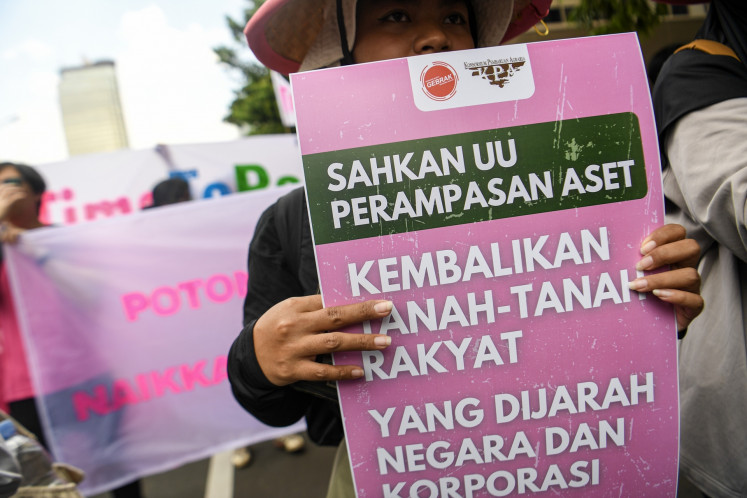Popular Reads
Top Results
Can't find what you're looking for?
View all search resultsPopular Reads
Top Results
Can't find what you're looking for?
View all search resultsEmbracing local products How hard can it be?
A national campaign to use local products struggles amid the flow of international brands
Change text size
Gift Premium Articles
to Anyone
A national campaign to use local products struggles amid the flow of international brands.
For the past few years, Indonesia has relied on its domestic market to propel its economy, triggering the Trade Ministry as well as Communications and Information Ministry to launch '100% Cinta Indonesia' (100% Love Indonesia), a campaign to use local products in 2009.
The campaign, initially a consumer awareness program to promote Indonesian products and brands, has transformed into a social movement to appreciate and love everything Indonesian ' from food, fashion, arts and crafts to traditional and pop culture.
The vast number of consumers and the relatively low level of manufacturing has created opportunities for imported consumer products to flood the local market.
Plaza Indonesia mall in Central Jakarta, for example, is home to luxury brands like Hermes, Louis Vuitton, Chanel and Dior. The famed brands are the main competitors for blossoming Indonesian fashion lines from prominent designers opening up stores in the same mall.
A recent study from Bain & Company found Southeast Asian countries, including Indonesia, are the new turbines of luxury growth in Asia, with 11 percent growth in the personal luxury goods market last year.
The study also found there is a tendency for Indonesian consumers to spend more on quality products despite their low incomes.
Actress Atiqah Hasiholan said she is willing to buy local brands although she admits she also purchases the international ones.
'I have various needs, especially in fashion, and it's common for me to buy local products, for example in The Goods Dept. They have a lot of great products,' Atiqah said, referring to the Jakarta-based curated department store that provides alternative fashion and lifestyle products from young and independent Indonesian designers and a selection of international brands.
Fashion stylist Dewi Utari expressed similar thoughts for the local brands. 'I think Indonesian fashion products have grown really well over the past few years. I support the campaign because I love local products. I have items by Nikicio, Patrick Owen and Edward Hutabarat in my closet, simply because they make great products,' she said.
Edward Hutabarat is famous for his flair for traditional fabrics, while the remaining two brands are created by young Indonesian designers with modern, versatile and simple drawings.
'I love Edward Hutabarat's work as he promotes Indonesia's own artistic fabrics in a most interesting way,' said Dewi, who is also a fan of fashion items from Givenchy, Chanel and Balenciaga.
Showing his support, popular emcee and television host Indra Herlambang claimed a local shoe brand was better than international names.
'Honestly, I can only find comfort by wearing Yongki Komaladi's shoes. I have a typical Indonesian foot shape, quite big around the toe area,' he said.
'So Yongki's shoes are just perfect for me. They don't give that annoying ache at the front and the price is inexpensive. Shoes from luxury international brands don't work for me as they feel cramped at the front.'
Despite their full support, Atiqah, Dewi and Indra are concerned about the sustainability of local products.
'We've been sort of bombarded with international brands and [the government] doesn't protect local producers,' said Atiqah.
She said countries with strong foundations in economy, production capacity and leading local brands like South Korea, for example, wouldn't be affected by the presence of international brands in their domestic markets.
'In Indonesia we don't have such foundations yet. Local producers can't put a cheap price on their products because they're not ready for mass production. Whenever we find local items with good quality, the price is just too high. Are we really ready to compete with international brands?' Atiqah said.
Meanwhile, Indra advised local producers to maintain their products' top quality.
'I see it this way: No matter how many international franchises are here, we'll always be faithful to kue lapis Surabaya (Surabaya layer cake). Why? Because we know it tastes great. Apply local wisdom while making local products with international quality.'










